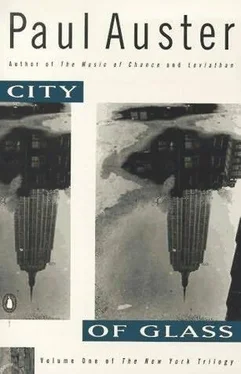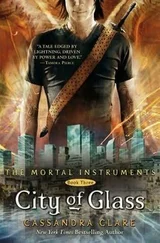Paul Auster - City of Glass
Здесь есть возможность читать онлайн «Paul Auster - City of Glass» весь текст электронной книги совершенно бесплатно (целиком полную версию без сокращений). В некоторых случаях можно слушать аудио, скачать через торрент в формате fb2 и присутствует краткое содержание. Жанр: Современная проза, на английском языке. Описание произведения, (предисловие) а так же отзывы посетителей доступны на портале библиотеки ЛибКат.
- Название:City of Glass
- Автор:
- Жанр:
- Год:неизвестен
- ISBN:нет данных
- Рейтинг книги:5 / 5. Голосов: 1
-
Избранное:Добавить в избранное
- Отзывы:
-
Ваша оценка:
- 100
- 1
- 2
- 3
- 4
- 5
City of Glass: краткое содержание, описание и аннотация
Предлагаем к чтению аннотацию, описание, краткое содержание или предисловие (зависит от того, что написал сам автор книги «City of Glass»). Если вы не нашли необходимую информацию о книге — напишите в комментариях, мы постараемся отыскать её.
City of Glass — читать онлайн бесплатно полную книгу (весь текст) целиком
Ниже представлен текст книги, разбитый по страницам. Система сохранения места последней прочитанной страницы, позволяет с удобством читать онлайн бесплатно книгу «City of Glass», без необходимости каждый раз заново искать на чём Вы остановились. Поставьте закладку, и сможете в любой момент перейти на страницу, на которой закончили чтение.
Интервал:
Закладка:
Quinn waited outside for the next two hours, pacing up and down the block, thinking that Stillman would perhaps emerge to look for dinner in one of the local coffee shops. But the old man did not appear, and at last Quinn decided he must have gone to sleep. He put in a call to Virginia Stillman from a pay booth on the comer, gave her a full report of what had happened, and then headed home to 107th Street.
8
THE next morning, and for many mornings to follow, Quinn posted himself on a bench in the middle of the traffic island at Broadway and 99th Street. He would arrive early, never later than seven o'clock, and sit there with a take-out coffee, a buttered roll, and an open newspaper on his lap, watching the glass door of the hotel. By eight o'clock Stillman would come out, always in his long brown overcoat, carrying a large, old-fashioned carpet bag. For two weeks this routine did not vary. The old man would wander through the streets of the neighborhood, advancing slowly, sometimes by the merest of increments, pausing, moving on again, pausing once more, as though each step had to, be weighed and measured before it could take its place among the sum total of steps. Moving in this manner was difficult for Quinn. He was used to walking briskly, and all this starting and stopping and shuffling began to be a strain, as though the rhythm of his body was being disrupted. He was the hare in pursuit of the tortoise, and again and again he had to remind himself to hold back.
What Stillman did on these walks remained something of a mystery to Quinn. He could, of course, see with his own eyes what happened, and all these things he dutifully recorded in his red notebook. But the meaning of these things continued to elude him. Stillman never seemed to be going anywhere in particular, nor did he seem to know where he was. And yet, as if by conscious design, he kept to a narrowly circumscribed area, bounded on the north by 110th Street, on the south by 72nd Street, on the west by Riverside Park, and on the east by Amsterdam Avenue. No matter how haphazard his journeys seemed to be-and each day his itinerary was different-Stillman never crossed these borders. Such precision baffled Quinn, for in all other respects Stillman seemed to be aimless.
As he walked, Stillman did not look up. His eyes were permanently fixed on the pavement, as though he were searching for something. Indeed, every now and then he would stoop down, pick some object off the ground, and examine it closely, turning it over and over in his hand. It made Quinn think of an archeologist inspecting a shard at some prehistoric ruin. Occasionally, after poring over an object in this way, Stillman would toss it back onto the sidewalk. But more often than not he would open his bag and lay the object gently inside it. Then, reaching into one of his coat pockets, he would remove a red notebook-similar to Quinn's but smaller-and write in it with great concentration for a minute or two. Having completed this operation, he would return the notebook to his pocket, pick up his bag, and continue on his way.
As far as Quinn could tell, the objects Stillman collected were valueless. They seemed to be no more than broken things, discarded things, stray bits of junk. Over the days that passed, Quinn noted a collapsible umbrella shom of its material, the severed head of a rubber doll, a black glove, the bottom of a shattered light bulb, several pieces of printed matter (soggy magazines, shredded newspapers), a tom photograph, anonymous machinery parts, and sundry other clumps of flotsam he could not identify. The fact that Stillman took this scavenging seriously intrigued Quinn, but he could do no more than observe, write down what he saw in the red notebook, hover stupidly on the surface of things. At the same time, it pleased him to know that Stillman also had a red notebook, as if this formed a secret link between them. Quinn suspected that Stillman's red notebook contained answers to the questions that had been accumulating in his mind, and he began to plot various stratagems for stealing it from the old man. But the time had not yet come for such a step.
Other than picking up objects from the street, Stillman seemed to do nothing. Every now and then he would stop somewhere for la meal. Occasionally he would bump into someone and mumble an apology. Once a car nearly ran him over as he was crossing the street. Stillman did not talk to anyone, did not go into any stores, did not smile. He seemed neither happy nor sad. Twice, when his scavenging haul had been unusually large, he returned to the hotel in the middle of the day and then reemerged a few minutes later with an empty bag. On most days he spent at least several hours in Riverside Park, walking methodically along the macadam footpaths or else thrashing through the bushes with a stick. His quest for objects did not abate amidst the greenery. Stones, leaves, and twigs all found their way into his bag. Once, Quinn observed, he even stooped down for a dried dog turd, sniffed it carefully, and kept it. It was in the park,.too, that Stillman rested. In the afternoon, often following his lunch, he would sit on a bench and gaze out across the Hudson. Once, on a particularly warm day, Quinn saw him sprawled out on the grass asleep. When darkness came, Stillman would eat dinner at the Apollo Coffee Shop on 97th Street and Broadway and then return to his hotel for the night. Not once did he try to contact his son. This was confirmed by Virginia Stillman, whom Quinn called each night after returning home.
The essential thing was to stay involved. Little by little, Quinn began to feel cut off from his original intentions, and he wondered now if he had not embarked on a meaningless project.
It was possible, of course, that Stillman was merely biding his time, lulling the world into lethargy before striking. But that would assume he was aware of being watched, and Quinn felt that was unlikely. He had done his job well so far, keeping at a discreet distance from the old man, blending into the traffic of the street, neither calling attention to himself nor taking drastic measures to 'keep himself hidden. On the other an, it was possible that Stillman had known all along that he would be watched-had even known it in advance-and therefore had not taken the trouble to discover who the particular watcher was. If being followed was a certainty, what did it matter? A watcher, once discovered, could always be replaced by another.
This view of the situation comforted Quinn, and he decided to believe in it, even though he had no grounds for belief. Either Stillman knew what he was doing or he didn't. And if he didn't, then Quinn was going nowhere, was wasting his time. How much better it was to believe that all his steps were actually to some purpose. If this interpretation required knowledge on Stillman's part, then Quinn would accept this knowledge as an article of faith, at least for the time being.
There remained the problem of how to occupy his thoughts as he followed the old man. Quinn was used to wandering. His excursions through the city had taught him to understand the connectedness of inner and outer. Using aimless motion as a technique of reversal, on his best days he could bring the outside in and thus usurp the sovereignty of inwardness. By flooding himself with externals, by drowning himself out of himself, he had managed to exert some small degree of control over his fits of despair. Wandering, therefore, was a kind of mindlessness. But following Stillman was not wandering. Stillman could wander, he could stagger like a blindman from one spot to another, but this was a privilege denied to Quinn. For he was obliged now to concentrate on what he was doing, even if it was next to nothing. Time and again his thoughts would begin to drift, and soon thereafter his steps would follow suit. This meant that he was constantly in danger of quickening his pace and crashing into Stillman from behind. To guard against this mishap he devised several different methods of deceleration. The first was to tell himself that he was no longer Daniel Quinn. He was Paul Auster now, and with each step he took he tried to fit more comfortably into the strictures of that transformation. Auster was no more than a name to him, a husk without conte nt. To be Auster meant being a man with no interior, a man with no thoughts. And if there were no thoughts available to him, if his own inner life had been made inaccessible, then there was no place for him to retreat to. As Auster he could not summon up any memories or fears, any dreams or joys, for all these things, as they pertained to Auster, were a blank to him. He consequently had to remain solely on his own surface, looking outward for sustenance. To keep his eyes fixed on Stillman, therefore, was not merely a distraction from the train of his thoughts, it was the only thought he allowed himself to have.
Читать дальшеИнтервал:
Закладка:
Похожие книги на «City of Glass»
Представляем Вашему вниманию похожие книги на «City of Glass» списком для выбора. Мы отобрали схожую по названию и смыслу литературу в надежде предоставить читателям больше вариантов отыскать новые, интересные, ещё непрочитанные произведения.
Обсуждение, отзывы о книге «City of Glass» и просто собственные мнения читателей. Оставьте ваши комментарии, напишите, что Вы думаете о произведении, его смысле или главных героях. Укажите что конкретно понравилось, а что нет, и почему Вы так считаете.












